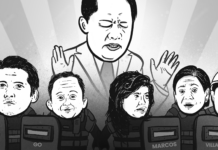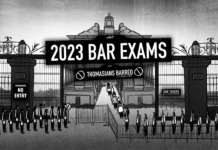WHEN President Duterte announced his intention to strengthen the Reserve Officers Training Corps (ROTC) during his first State of the Nation Address last July 25, many interpreted it as a call for the revival of the mandatory ROTC program for college students.
“The reservists will be mobilized for information campaign against drug use and the dissemination of information regarding drug rehabilitation programs being offered by the government,” President Duterte said. “Let us also strengthen our ROTC Program to instill love of country and good citizenship.”
As a result, newbie Senator Sherwin Gatchalian and the Commission on Higher Education (Ched) are pushing for the restoration of mandatory ROTC. In addition, there’s the pending House Bill No. 2338, which seeks to make ROTC a pre-requisite for graduation in all college programs as well as vocational and technical courses.
Ched Chair Patricia Licuanan said the commission would create working group to review the existing ROTC program and recommend options to strengthen it.
Licuanan still has two years as Ched chair based on her 2014 appointment by the former Malacanang incumbent and for an educator who had come from the private education sector, she seems overeager to keep her post by sidling up to the new government, never mind basic and bottomline principles, just as she did with the previous one that pressed through with the K to 12 despite the lack of safety nets for those who would be affected by it, especially higher-education institution (HEI) teachers. So much for Licuanan’s sycophancy and lack of nobless oblige.
In any case, Duterte has all the wrong reasons for restoring mandatory ROTC. If he wanted the ROTC to help in his anti-drug information campaign, he could do that with already existing structures in the HEI’s. ROTC as it stands now is one of the three options under the National Service Training Program (NSTP) for HEI students. Couldn’t the anti-drug campaign be disseminated and promoted not only in the optional ROTC but also in the more popular literacy and civic welfare programs?
Going by the results of the anti-drug campaign—hundreds and now thousands of alleged drug pushers killed en mass in what are suspected to be summary executions of small fry while drug lords and their protectors in the police, military and government are given official warning and even pleadings and thus the big guns are generally treated with kid gloves—then the Duterte administration does not need a mandatory ROTC to help it in its charade. Huwag naman sanang masyadong garapalan!
The President should be reminded that it was because of the same example of state terror and corruption that led to the abolition of mandatory ROTC. It should not be forgotten that the ROTC became an avenue for irregularities, including hazing, physical abuse, extortions and corruption. These unsconscionable practices led to the killing of UST ROTC cadet Mark Welson Chua in 2001. It was Chua who filed a complaint with the Department of Defense over irregularities in the ROTC; his complaint was reported by the Varsitarian and opened a can of worms in the festering program. Shortly afterward, Chua’s body was found floating on the Pasig River—his head wrapped with a silver packaging tape, his hands tied with shoestring and his legs bound by a packaging tape.
The perpetrators? His fellow ROTC cadet officers who were sons of officers from the police and military. His killers have been convicted in absentia; they’re still on the loose a dozen years after their sentencing. One could only wonder why the police, military and the defense establishment have not brought them to justice up to now!
The 2001 incident sparked campus unrest and caused colleges and universities to push for the abolition of the mandatory ROTC. It was in fact UST—via its rector at that time, Fr. Tamerlane Lana, OP—that initially called for the abolition of compulsory ROTC and rallied the University Belt consortium in calling on Congress to act. As a result, Republic Act No. 9163, otherwise known as the National Service Training Program Act of 2001, was passed, which made ROTC an optional one-year program.
We had thought that the move to restore mandatory ROTC had something to do with the need to strengthen external defense as a result of Chinese bullying and territorial aggressiveness in the West Philippine Sea. But Duterte and his pretender foreign secretary, Perfecto Yasay, are known to kowtow to Beijing.
In any case, Duterte and his lackeys in Congress and sycophants in Ched should be reminded that even as an optional program, ROTC has added tens of thousands to the reservist pool of the armed forces; there are enough warm and young bodies to conscript in case of a sudden war with the nation’s enemies. But that of course is merely false comfort when one considers that reservists may have been poorly trained and lacked discipline. Look at the road-rage incident that resulted in the killing in Quiapo of an unarmed biker in cold blood by an army reservist!
President Duterte must realize that the ROTC program is not the only avenue to foster nationalism, patriotism and good citizenship.
The kind of military training, which historically has fostered the culture of “political patronage, violence, sexism and machismo,” as one lawmaker puts it, does not cultivate love of nation and service to others; it engenders twisted, even murderous, values as shown by the hateful history of the ROTC.
To revive compulsory ROTC would restore one dark legacy of Ferdinand Marcos’s martial law—state bossism and terrorism on campus.










